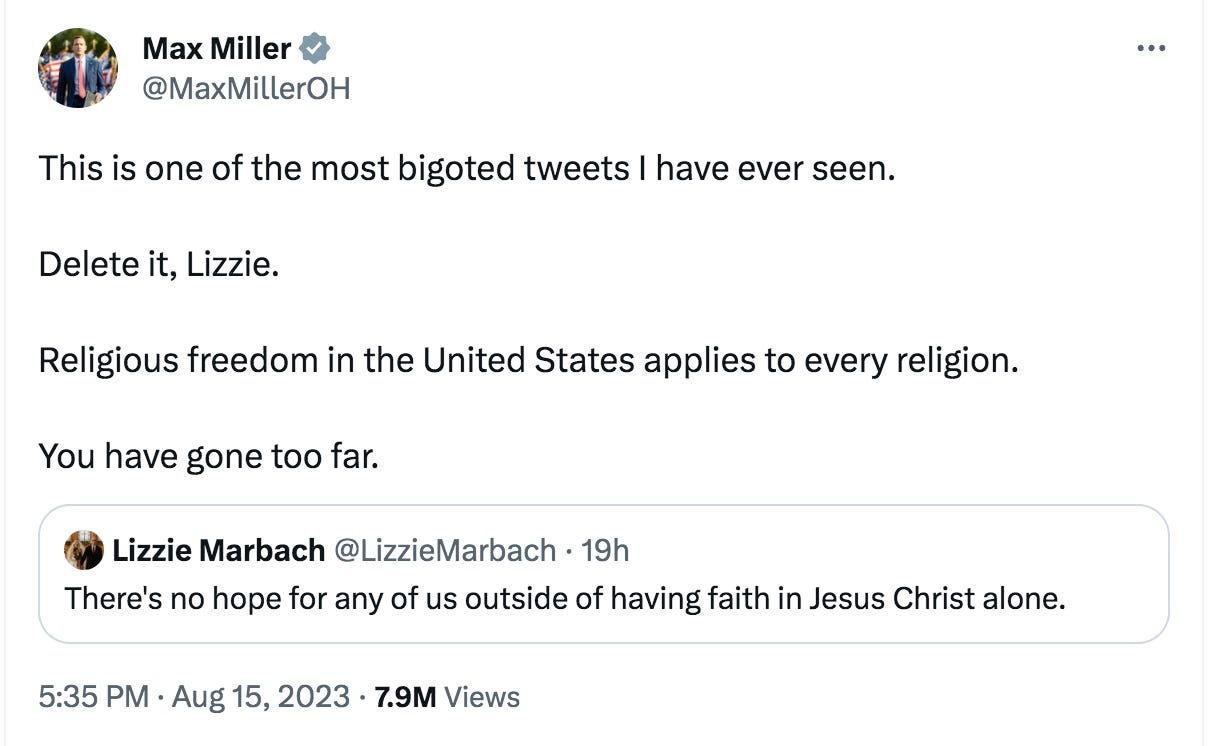E-Pluribus | August 16, 2023
Pluralism's main squeeze; democratic socialists and libertarians agree: sunburn is bad; and principles should protect everyone, not just the principle holder.
A round-up of the latest and best writing and musings on the rise of illiberalism in the public discourse:
Chris Walsh and William McKenzie: Figuring Out The 'Juice’ of Free Speech and Pluralism
In March, former Stanford Law School’s Associate Dean for Diversity, Equity, and Inclusion Tirien Steinbach infamously asked, “Is the juice worth the squeeze?” at Stanford as students tried to shut down a speaker with whom they disagreed. Writing for the President George W. Bush Center, Chris Walsh and William McKenzie explain why they answer with a resounding, Yes!
These challenges aren’t new. The ancient Greeks wrestled with questions around the limitations of free expression. As scholar Teresa M. Bejan detailed in a 2017 Atlantic article, there were two main conceptions of free speech recognized in ancient Greece: isegoria and parrhesia. “Isegoria described the equal right of citizens to participate in public debate in the democratic assembly; parrhesia, the license to say what one pleased, how and when one pleased, and to whom,” she wrote.
These two interpretations of freedom of expression – with isegoria emphasizing equality and parrhesia liberty – are central to current debates around speech, particularly on college campuses, Bejan argues.
Perhaps what is missing, Bejan notes, is a commitment to a third form of expression described by the ancient Greeks and championed by the likes of Plato and Aristotle called logos – “reason or logical argument” – which wasn’t regularly associated with either isegoria or parrhesia.
The best approach lies with maximizing the space for acceptable expression – particularly in the cultural context. Ideally, this would mean rejecting an environment in which the fear of social consequences restrains the authentic expression of ideas and adversarial opinions while at the same time engaging with others in the spirit of civility.
As a country, we must deal with controversial and uncomfortable ideas all the time. Former Secretary of State Condoleezza Rice put it well when she said during a Reimagining Democracy event: “We don’t have a constitutional right to be comfortable.”
Moreover, we must accept that not everyone shares the same views on issues that we do. This doesn’t mean that such viewpoints should be immune from sharp criticism – on the contrary, dialogue or reasoned argument should be a preferred method for engaging with different opinions and refining our own views.
Read it all.
Robby Soave: AOC Slams the FDA's Harmful Overregulation of Sunscreen
No one likes sunburn, and the issue has created some strange (tanning) bedfellows. Although in 2015, fellow democratic socialist Bernie Sanders mocked the overabundance of consumer choices available in America, Rep. Alexandria Ocasio-Cortez recently decried the overregulation of sunscreen that artificially limits what is available in this country and creates unnecessary risks, as Robby Soave reports at Reason.
Credit where credit is due: Rep. Alexandria Ocasio-Cortez (D–N.Y.) may be a self-described democratic socialist, but when it comes to the Food and Drug Administration's (FDA) overregulation of sunscreen—a nontrivial issue—she sounds a lot like a libertarian.
In a recent TikTok video, AOC interviewed esthetician Charlotte Palermino about the abysmally limited sunscreen options in the United States.
"U.S. sunscreen regulations are not necessarily making us more safe," explains Palermino. And AOC agrees:
AOC is calling out a very real problem. Sunscreen is regulated like a drug, which means the product is subject to byzantine FDA regulations that have largely thwarted innovation in the category for the last 20 years.
[ . . . ]
If the FDA won't clear more sunscreen ingredients for use in the U.S., the agency should at the very least allow reciprocity: Foreign sunscreens could be made available with warning labels noting that they were approved by European health officials but not by the FDA. Of course, the best option would be for U.S. regulators to simply get out of the way and acknowledge that these products are obviously safe for human use. Indeed, not approving them is the greater danger, since using sunscreen is one of the best ways to prevent skin cancer.
In her TikTok video, AOC encourages her supporters to confront their members of Congress on this issue. Ideally, she would pursue the argument she's making here to its logical end and endorse very broad regulatory reform. After all, FDA inaction is depriving Americans of much more than just sunscreen: Regulatory hurdles are partly responsible for everything from the baby formula shortage to the high price of insulin.
Read the whole thing.
Angel Eduardo: The Supreme Court Case That Exemplifies Our Culture War Blindness
Many Americans claim that they do not want to receive special treatment, but their reactions to social, political, and cultural issues suggest otherwise. Too often, there is a willful blindness to how we make ourselves exceptions to the rules and requirements we wish to impose on others, Angel Eduardo writes at Persuasion.
[T]he Constitution or constitutional law can’t work on the basis of my or anyone else’s preferences or opinions on such issues [such as same-sex marriage]. The thing about principles is that they must be consistent, and that sometimes means swallowing hard pills. I recognize that Smith has a right to her views, no matter how backward I might find them—and I know that protecting her right to those views also protects my right to my own.
So why can’t so many journalists and commentators see the underlying principle at play with 303 Creative?
The short answer: The culture war is blinding.
The supercharged nature of our politics keeps us from seeing or understanding the fundamental ideas underlying many of our conflicts. If certain details are implicated—if, for example, the dispute involves historically marginalized groups who have long fought for equal rights, as in 303 Creative—we have trouble keeping things straight when they would otherwise be crystal clear. The culture war and our political tribalism keep us from understanding how forcing a web designer to express approval for gay marriage exercises precisely the same principle as (to borrow an example from David French) forcing an artist to paint a flattering portrait of a white supremacist.
This kind of blindness is dangerous. Losing sight of the overarching, long-standing principles of freedom and free expression that underpin our laws and norms makes it easier to lose them altogether. This hurts everyone, including the groups that 303 Creative dissenters believe they’re fighting for.
Read it all here.
Around Twitter
Tuesday, Congressman Max Miller of Ohio had a rather strong reaction to a tweet expressing another user’s rather basic Christian belief. Miller later apologized for a “message [he] did not intend,” but Congresswoman Ilhan Omar posted a strong defense of expression of religious freedom:
Via Nicholas Christakis, a court has found that the city of Washington D.C. has been selectively enforcing vandalism statutes, a violation of free expression:
And finally, via Alex Nowrasteh, Stephanie Slade on the benefits of true tolerance and diversity:











